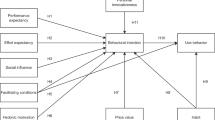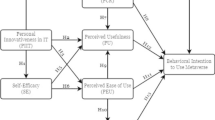Abstract
Psychological ownership (PO) is a sense of being psychologically tied to an object to the extent that it becomes part of the extended self. As technology becomes ubiquitous in daily lives, research have shown the potential of this concept to influence users’ behavior. Hence, this study incorporates PO and its antecedents with the beliefs of perceived ease of use (PEU) and perceived usefulness (PU) to predict teachers’ intention to continue using a cloud-based virtual learning environment (cVLE). A hypothesized model with direct and mediated relationships was tested with data obtained from 1068 practicing secondary school teachers using the cVLE. Results from structural equation modeling supported the model, which explained 56.3% of variance in continuance intention with sufficient predictive relevance (Stone–Geisser Q2 = 0.463). Results demonstrated that the tenets of PO hold true in the cVLE context, as a significant influence to PEU and PU, as well as a significant mediator in the hypothesized model. PEU was found to have a stronger effect than PU on continuance intention, implying its importance despite teachers having gained experience in using it and the cVLE considered as user-friendly.


Similar content being viewed by others
References
Awang, H., Aji, Z. M., Mohd Yaakob, M. F., Sheik Osman, W. R., Mukminin, A., & Habibi, A. (2018). Teachers’ intention to continue using virtual learning environment (VLE): Malaysian context. Journal of Technology and Science Education, 8(4), 439–452.
Bagozzi, R. P. (2007). The legacy of the Technology Acceptance Model and a proposal for a paradigm shift. Journal of the Association for Information Systems, 8(4), 244–254.
Bagozzi, R. P., Yi, Y., & Phillips, L. W. (1991). Assessing construct validity in organizational research. Administrative Science Quarterly, 36, 421–458.
Barki, H., Paré, G., & Sicotte, C. (2008). Linking IT implementation and acceptance via the construct of psychological ownership of information technology. Journal of Information Technology, 23, 269–280.
Baron, R. M., & Kenny, D. A. (1986). The moderator–mediator variable distinction in social psychological research: Conceptual, strategic, and statistical considerations. Journal of Personality and Social Psychology, 51, 1173–1182.
Beggan, J. K. (1992). On the social nature of non-social perception: The mere ownership effect. Journal of Personality and Social Psychology, 62(2), 229–237.
Beggan, J. K., & Brown, E. M. (1994). Association as a psychological justification for ownership. The Journal of Psychology, 128(4), 365–380.
Bhattacherjee, A. (2001). Understanding information systems continuance: An expectation–confirmation model. MIS Quarterly, 25(3), 351–370.
Brown, G., Pierce, J. L., & Crossley, C. (2014). Toward an understanding of the development of ownership feelings. Journal of Organizational Behavior, 35, 318–338.
Buchem, I., Tur, G., & Hölterhof, T. (2014). Learner control in personal learning environments: A cross-cultural study. Journal of Literacy and Technology, 15(2), 14–53.
Chen, C., Zhao, Q., & Wang, J. (2016). Psychological ownership: An empirical study on its antecedents and impacts upon social media loyalty. In Paper presented at the 2016 Pacific Asia conference on information systems, Chiayi, Taiwan.
Cheok, M. L., Wong, S. L., Ayub, A. F., & Mahmud, R. (2017). Teachers’ perceptions of e-learning in Malaysian secondary schools. Malaysian Online Journal of Educational Technology, 5(2), 20–33.
Chien, S. P., Wu, H. K., & Hsu, Y. S. (2014). An investigation of teachers’ beliefs and their use of technology-based asessments. Computers in Human Behavior, 31, 198–210. https://doi.org/10.1016/j.chb.2013.10.037.
Cohen, J. (1988). Statistical power analysis for the behavioral sciences. Hillsdale, NJ: Erlbaum.
Csikszentmihalyi, M., & Rochberg-Halton, E. (1981). The meaning of things: Domestic symbols and the self. Cambridge, MA: Cambridge University Press.
Davis, F. (1989). Perceived usefulness, perceived ease of use, and user acceptance of information technology. MIS Quarterly, 13(3), 319–340.
Fisher, J. F., Bushko, K., & White, J. (2017). Blended beyond borders: A scan of blended learning obstacles and opportunities in Brazil, Malaysia, and South Africa. Christensen Institute. https://www.christenseninstitute.org.
FrogAsia. (2014). About us. https://www.frogasia.com/v3/aboutus/.
Hair, J. F., Hult, G. M., Ringle, C. M., & Sarstedt, M. (2014). A primer on partial least squares structural equation modeling (PLS-SEM). Thousand Oaks, CA: Sage Publications.
Hair, J. F., Hult, G. M., Ringle, C. M., & Sarstedt, M. (2017). A primer on partial least squares structural equation modeling (PLS-SEM) (2nd ed.). Thousand Oaks, CA: Sage Publications.
Henseler, J., Ringle, C. M., & Sarstedt, M. (2015). A new criterion for assessing discriminant validity in variance-based structural equation modeling. Journal of the Academy of Marketing Science, 43(1), 115–135.
Hew, T.-S., & Syed Abdul Kadir, S. L. (2016). Behavioural intention in cloud-based VLE: An extension to Channel Expansion Theory. Computers in Human Behavior, 64, 9–20.
Huang, H., Parolia, N., & Cheng, K. (2016). Willingness and ability to perform information security compliance behavior: Psychological ownership and self-efficacy perspective. In Paper presented at the 20th Pacific Asia conference on information systems, Chiayi, Taiwan. http://aisel.aisnet.org/pacis2016/57.
Kanwal, F., & Rehman, M. (2017). Factors affecting e-learning adoption in developing countries—Empirical evidence from Pakistan’s higher education sector. IEEE Access, 5, 10968–10978.
Karahanna, E., Xu, S. X., & Zhang, N. (2015). Psychological ownership motivation and use of social media. Journal of Marketing Theory and Practice, 23(2), 185–207.
Klesel, M., Ndicu, M., & Niehaves, B. (2016). Exploring psychological ownership of IT: An empirical study. In Proceedings of the twenty-fourth European conference on information systems (ECIS), Istanbul, Turkey.
Kong, S. C., Looi, C. K., Chan, T. W., & Huang, R. (2017). Teacher development in Singapore, Hong Kong, Taiwan, and Beijing for e-learning in school education. Journal of Computers in Education, 4(1), 5–25.
Lee, Y., & Chen, A. N. (2011). Usability design and psychological ownership of a virtual world. Journal of Management Information Systems, 28(3), 269–307.
Lin, K. (2011). E-learning continuance intention: Moderating effects of user e-learning experience. Computers and Education, 56(6), 515–526.
Mathieson, K. (1991). Predicting user intentions: Comparing the technology acceptance model with the theory of planned bahaviour. Information Systems Research, 2(3), 173–191.
McGill, T. J., Klobas, J. E., & Renzi, S. (2014). Critical success factors for the continuation of e-learning initiatives. Internet and Higher Education, 22, 24–36.
Ministry of Education Malaysia. (2018, August 12). Malaysian education quality standard 2nd wave. https://moe.gov.my/index.php/en/arkib/pemberitahuan/2018/4183-skpmg2-2018.
Miranda, P., Isaias, P., Costa, C. J., & Pifano, S. (2017). Validation of an e-learning 3.0 critical success factors framework: A qualitative research. Journal of Information Technology Education: Research, 16, 339–363.
Paré, G., Sicotte, C., & Jacques, H. (2006). The effects of creating psychological ownership on physicians’ acceptance of clinical information systems. Journal of the American Medical Informatics Association, 13(2), 197–205.
Pierce, J. L., & Jussila, I. (2011). Psychological ownership and the organizational context: Theory, research evidence, and application. Cheltenham: Edward Elgar Publishing.
Pierce, J. L., Kostova, T., & Dirks, K. T. (2001). Toward a theory of psychological ownership in organization. The Academy of Management Review, 26(2), 298–310.
Podsakoff, P. M., MacKenzie, S. B., & Podsakoff, N. P. (2012). Source of method bias in social science research and recommendations on how to control it. Annual Review of Psychology, 63, 539–569.
Pynoo, B., & van Braak, J. (2014). Predicting teachers’ generative and receptive use of an educational portal by intention, attitude and self-reported use. Computers in Human Behavior, 34, 315–322.
Ramayah, T., Ling, N. S., Taghizadeh, S. K., & Rahman, S. A. (2016). Factors influencing SMEs website continuance intention in Malaysia. Telematics and Informatics, 33, 150–164.
Rodríguez-Ardura, I., & Meseguer-Artola, A. (2014). What leads people to keep on e-learning? An empirical analysis of users’ experiences and their effects on continuance intention. Interactive Learning Environments, 24(6), 1030–1053.
Sánchez-Prieto, J. C., Olmos-Migueláñez, S., & García-Peñalvo, F. J. (2017). MLearning and pre-service teachers: An assessment of the behavioral intention using an expanded TAM model. Computers in Human Behavior, 72, 644–654.
Shao, Z. (2018). Examining the impact mechanism of social psychological motivations on individuals’ continuance intention of MOOCs: The moderating effect of gender. Internet Research, 28(1), 232–250.
Shiau, W., & Chau, P. Y. (2016). Understanding behavioral intention to use a cloud computing classroom: A multiple model comparison approach. Information and Management, 53, 355–365.
Smith, K. (2017). Teachers as self-directed learners. Singapore: Springer.
Smith, T., Grant, G., & Ramirez, A. (2014, January 6–9). Investigating the influence of psychological ownership and resistance on usage intention among physicians. In R. H. Sprague (Ed). Proceedings of the 47th Hawaii international conference on system science (pp. 2808–2817). Hawaii: IEEE Computer Society.
Šumak, B., Heričko, M., & Pušnik, M. (2011). A meta-analysis of e-learning technology acceptance: The role of user types and e-learning technology types. Computers in Human Behavior, 27, 2067–2077.
Teo, T., Lee, C. B., & Chai, C. S. (2008). Understanding pre-service teachers’ computer attitudes: Applying and extending the technology acceptance model. Journal of Computer Assisted Learning, 24, 128–143.
Turkle, S. (2011). Alone together: Why we expect more from technology and less from each other. New York: Basic Books.
United Nations Educational, Scientific and Cultural Organization, UNESCO. (2013). Malaysia education policy review abridged report. http://www.unesco.org/new/fileadmin/MULTIMEDIA/HQ/ED/pdf/M_EPR-abridged-report-Annex-24052013.pdf.
Van Dyne, L., & Pierce, J. L. (2004). Psychological ownership and feelings of possession: Three field studies predicting employee attitudes and organizational citizenship behavior. Journal of Organizational Behavior, 25, 439–459.
Wang, W. T., & Wang, C. C. (2009). An empirical study of instructor adoption of web-based learning systems. Computers and Education, 53, 761–774.
Webster, J., Trevino, L. K., & Ryan, L. (1993). The dimensionality and correlates of flow in human–computer interactions. Computers in Human Behavior, 9(4), 411–426.
Yang, M., Shao, Z., Liu, Q., & Liu, C. (2017). Understanding the quality factors that influence the continuance intention of students toward participation in MOOCs. Education Technology Research Development, 65(5), 1195–1214.
Yim, J. S. C., Priscilla, M., & Azalea, A. (2018). Effects of psychological ownership on teachers’ beliefs about a cloud-based virtual learning environment. Research and Practice in Technology Enhanced Learning, 13(13), 1–19.
Zhang, T., Agarwal, R., & Lucas, H. C. (2011). The value of IT-enabled retailer learning: Personalized product recommendations and customer store loyalty in electronic markets. MIS Quarterly, 35(4), 859–881.
Zhao, Q., Chen, C. D., & Wang, J. L. (2016). The effects of psychological ownership and TAM on social media loyalty: An integrated model. Telematics and Informatics, 33, 959–972.
Zhao, X., Lynch, J. G., & Chen, Q. (2010). Reconsidering Baron and Kenny: Myths and truths about mediation analysis. Journal of Consumer Research, 37(2), 197–206.
Funding
This research is funded by Universiti Tunku Abdul Rahman Research Fund (UTARRF) Grant Number 6200/P23.
Author information
Authors and Affiliations
Corresponding author
Ethics declarations
Conflict of interest
The authors declare that they have no conflict of interest.
Additional information
Publisher's Note
Springer Nature remains neutral with regard to jurisdictional claims in published maps and institutional affiliations.
Rights and permissions
About this article
Cite this article
Yim, J.SC., Moses, P. & Azalea, A. Predicting teachers’ continuance in a virtual learning environment with psychological ownership and the TAM: a perspective from Malaysia. Education Tech Research Dev 67, 691–709 (2019). https://doi.org/10.1007/s11423-019-09661-8
Published:
Issue Date:
DOI: https://doi.org/10.1007/s11423-019-09661-8




